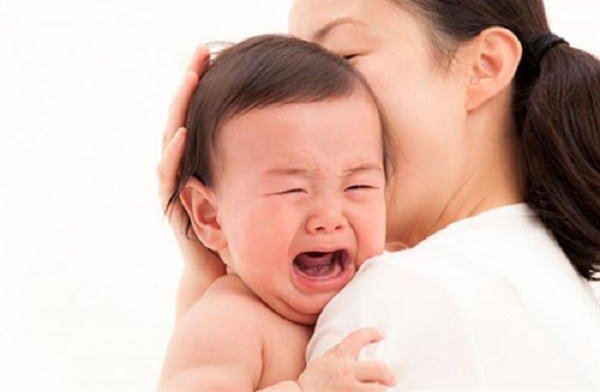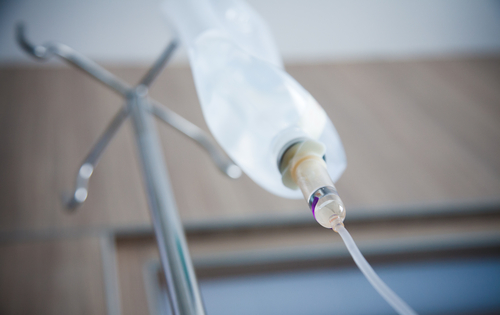Abnormal rotator cuff and fixed bowel disease in neonates: Symptoms, treatment
The article was professionally consulted by Specialist Doctor II Tran Van Trong - Specialist in Pediatric Surgery, Plastic Surgery - Aesthetics - Department of General Surgery, Vinmec Danang International Hospital
Abnormal rotator cuff and fixed bowel disease is a birth defect that occurs when a newborn's intestines are not properly arranged in the abdomen, causing the mesentery to narrow and leading to the small intestine being easily twisted together. . This can cause intestinal volvulus, blocking blood flow to the intestines and eventually leading to bowel necrosis.
1. Symptoms of bowel abnormal rotation and fixation
One of the earliest signs of abnormal bowel rotation and fixation (English name is Malrotation) is abdominal pain and spasms caused by the child's inability to push the bowel through the stricture.
When spasms and colic due to deformity, the baby will start crying when pulling the leg up, then stop crying suddenly, return to normal for 10 or 15 minutes, then start crying again, Children keep repeating these expressions. Other symptoms of an abnormally fixed and rotated bowel may include:
Vomiting profusely, vomit often green or yellow-green Abdominal swelling and firmness Pale skin Poor appetite Little or no urine Irregular bowel movements Blood in stools Fever Fatigue

Trẻ sốt, mệ mỏi là một trong các dấu hiệu của ruột quay và cố định bất thường
Most children with this condition have symptoms within the first year of life. Some children are malnourished for a long time without any symptoms and are never diagnosed due to mild torsion of the intestine. Others may not have symptoms until adolescence or adulthood.
Nearly 60% of cases of abnormal rotation and fixation are diagnosed within the first week of life. And it happens equally in boys and girls. However, boys have more symptoms in the first month than girls.
2. Diagnosis of abnormal rotator cuff and fixed bowel disease in infants
After performing a thorough physical exam, the doctor will order tests to assess the position of the intestine and look for signs of a twisted or obstructed bowel. Some diagnostic techniques for abnormal rotation and fixation of the bowel include:
Abdominal X-ray: X-rays may show the location of the blockage in the intestinal tract (if you are concerned that the X-ray will affect your health). For the health of the baby, you can refer to the information here). Contrast X-ray: A water-based contrast agent is a liquid that makes the intestines show up better when you have an X-ray. For this diagnostic technique, a water-based contrast agent is inserted into the intestines through the anus and then taken with an X-ray. CT scan: CT is the abbreviation for Computed Tomography. This diagnostic technique uses a computer and X-rays to create multiple images from many different angles of the body to give the doctor an accurate picture of the body's organs. In the case of a baby with a birth defect, the doctor will use a CT scan to look for a blockage in the intestines. If you are worried about whether a CT scan will affect your baby's health, you can learn more here.
3. Treatment of abnormal rotator cuff and fixed bowel disease in infants
Abnormal rotator cuff and fixed bowel disease is considered an emergency and, if it progresses to volvulus, is life-threatening. As for the treatment for abnormal rotator cuff and fixed bowel disease, the child will need surgery to return the bowel to a normal position. Usually, the child will be started with intravenous fluids to prevent dehydration and given antibiotics to prevent infection.

Truyền dịch tiêm tĩnh mạch để tránh mất nước và sử dụng thuốc kháng sinh để ngăn ngừa nhiễm trùng
In the case of abnormal rotation and fixation of the bowel to volvulus, the child will need surgery to treat it as soon as possible. First, the intestines will be untwisted and checked for damage in the intestines. If there is no problem with the small intestine after volvulus, the doctor will close the abdomen, however, if there is any necrosis, it will have to be removed.
Treatment of rotator cuff disease and abnormal fixation as soon as possible, the smaller the bowel lesions. To avoid the worst-case scenario (enteric gangrene), you should treat your baby as soon as possible.
Treatment of rotator cuff disease and abnormal fixation as soon as possible, the smaller the bowel lesions. To avoid the worst-case scenario (enteric gangrene), you should treat your baby as soon as possible.
Để đặt lịch khám tại viện, Quý khách vui lòng bấm số HOTLINE hoặc đặt lịch trực tiếp TẠI ĐÂY. Tải và đặt lịch khám tự động trên ứng dụng MyVinmec để quản lý, theo dõi lịch và đặt hẹn mọi lúc mọi nơi ngay trên ứng dụng.
Reference source: my.clevelandclinic.org






